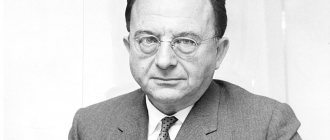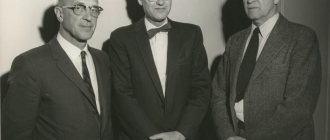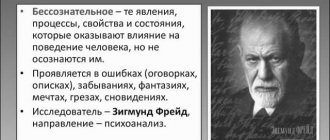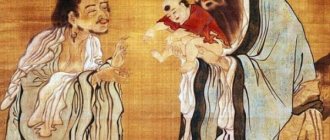Erich Seligmann Fromm is a world-famous American psychologist and humanistic philosopher of German origin. His theories, although rooted in Freudian psychoanalysis, focus on the individual as a social being who uses the powers of reasoning and love to move beyond instinctual behavior.
Fromm believed that people should be responsible for their own moral decisions, and not just for complying with the norms imposed by authoritarian systems. In this aspect of his thinking he was influenced by the ideas of Karl Marx, especially his early "humanistic" thoughts, and his philosophical works therefore fall under the neo-Marxist Frankfurt School - a critical theory of industrial society. Fromm rejected violence, believing that through empathy and compassion, people can rise above the instinctive behavior of the rest of nature. This spiritual aspect of his thinking may have resulted from his Jewish background and Talmudic education, although he did not believe in a traditional Jewish God.
The humanistic psychology of Erich Fromm had the greatest influence on his contemporaries, although he distanced himself from its founder, Carl Rogers. His book, The Art of Loving, remains a popular bestseller as people seek to understand the meaning of “true love,” a concept so profound that even this work only scratches the surface.
Early biography
Erich Fromm was born on March 23, 1900 in Frankfurt am Main, then part of the Prussian Empire. He was the only child in an Orthodox Jewish family. His two great-grandfathers and his paternal grandfather were rabbis. His mother's brother was a respected Talmudist. At the age of 13, Fromm began studying the Talmud, which lasted 14 years, during which he became familiar with socialist, humanist and Hasidic ideas. Although religious, his family, like many Jewish families in Frankfurt, was engaged in trade. According to Fromm, his childhood took place in two different worlds - the traditional Jewish one and the modern commercial one. By age 26, he had rejected religion because he felt it was too controversial. However, he retained his early memories of the Talmud's messages of compassion, redemption, and messianic hope.
Two events in the early biography of Erich Fromm seriously influenced the formation of his views on life. The first happened when he was 12 years old. It was the suicide of a young woman who was a family friend of Erich Fromm. There were many good things in her life, but she could not find happiness. The second event occurred at the age of 14 - the First World War began. According to Fromm, many usually kind people became evil and bloodthirsty. The search for understanding the causes of suicide and militancy underlies many of the philosopher’s thoughts.
Erich Fromm and the systemic crises of Western society
To understand Erich Fromm's theory of humanistic psychoanalysis, it is necessary to get to know him as a person, to understand his roots, the situation in which he grew up, and the evolving world that constitutes his most immediate reality. This will shed light on what guided and inspired his theories.
When you read his autobiography, Beyond the Chains of Illusion, and focus on his childhood and youth, it is easy to see that these were not exactly happy times for him. His father was an aggressive businessman, his mother suffered from chronic depression, and he was raised according to the noticeably strict norms of Orthodox Judaism. During this time, he experienced two defining moments.
The first was the suicide of a 25-year-old woman with whom he had been in love as a child. She was an artist who was very close to her only family member: her father. He died suddenly and a few days later she committed suicide. Her suicide made Fromm think about what makes people go to such extremes.
The second defining moment was the outbreak of the First World War, in which the shadow of nationalism, the radicalization of the masses and messages of hatred entered his life.
The world began to fall apart, and the cracks not only created insurmountable distances between various powers, but also initiated a period of systemic crisis throughout Western society. All psychological, philosophical and social theories up to this point had to be reformulated in search of answers and explanations in the midst of such chaos.
Teaching activities in Germany
In 1918 Fromm began his studies at the Johann Wolfgang Goethe University in Frankfurt am Main. The first 2 semesters were devoted to jurisprudence. During the summer semester of 1919, he transferred to the University of Heidelberg to study sociology with Alfred Weber (brother of Max Weber), Karl Jaspers and Heinrich Rickert. Erich Fromm received a diploma in sociology in 1922 and completed his studies in psychoanalysis at the Psychoanalytic Institute in Berlin in 1930. That same year he started his own clinical practice and began working at the Frankfurt Institute for Social Research.
After the Nazis came to power in Germany, Fromm fled to Geneva and, in 1934, to Columbia University in New York. In 1943, he helped open the New York branch of the Washington School of Psychiatry, and in 1945, the William Alanson White Institute of Psychiatry, Psychoanalysis and Psychology.
Philosophy
In the mid-20s, Erich Fromm became a psychoanalyst. He soon entered private practice, which continued for 35 long years.
Over the years of his biography, Fromm managed to communicate with thousands of patients, trying to penetrate and understand their subconscious.
Erich Fromm in his youth and adulthood
The doctor managed to collect a lot of useful material, which allowed him to study in detail the biological and social features of the formation of the human psyche.
In the period 1929-1935. Erich Fromm researched and classified his observations. At the same time, he wrote his first works, which spoke about the methods and tasks of psychology.
In 1933, when the National Socialists, led by Adolf Hitler, came to power, Erich was forced to flee to Switzerland. A year later, he decided to leave for the USA.
Once in America, the man taught psychology and sociology at Columbia University.
Immediately after the end of World War II (1939-1945), the philosopher became the founder of the William White Institute of Psychiatry.
In 1950, Erich went to Mexico City, where he taught at the National Autonomous University for 15 years. During this biography, he published the book “A Healthy Society,” in which he openly criticized capitalism.
The psychoanalyst's work was a great success. His work “Escape from Freedom” became a real bestseller. In it, the author talked about changes in the psyche and behavior of a person in Western culture.
The book also paid attention to the period of the Reformation and the ideas of theologians John Calvin and Martin Luther.
In 1947, Fromm published a sequel to the acclaimed “Escape,” calling it “A Man for Himself.” In this work, the author developed the theory of human self-isolation in the world of Western values.
In the mid-50s, Erich Fromm became interested in the topic of the relationship between society and man. The philosopher sought to “reconcile” the opposing theories of Sigmund Freud and Karl Marx. The first argued that man is asocial by nature, while the second called man a “social animal.”
Studying the behavior of people from different social strata and living in different countries, Fromm saw that the lowest percentage of suicides occurred in poor countries.
The psychoanalyst designated radio broadcasting, television, rallies and other public events as “ways of escape” from nervous disorders, and if such “benefits” are taken away from a Western person for one month, then with a high degree of probability he will be diagnosed with neurosis.
In the 60s, a new book, “The Soul of Man,” was published from the pen of Erich Fromm. In it he discussed the nature of evil and its manifestations.
The writer concluded that violence is a product of the desire for dominance, and that the threat is posed not so much by sadists and maniacs, but by ordinary people who have all the levers of power.
In the 70s, Fromm published the work “Anatomy of Human Destructiveness,” where he raised the topic of the nature of an individual’s self-destruction.
Personal life
Erich Fromm was married three times. His first wife was Frieda Reichmann, a psychoanalyst who gained a good reputation for her effective clinical work with schizophrenics. Although their marriage ended in divorce in 1933, Fromm acknowledged that she taught him a lot. They maintained friendly relations until the end of their lives. At the age of 43, Fromm married a fellow emigrant from Germany of Jewish origin, Henny Gurland. Due to problems with her health, the couple moved to Mexico in 1950, but the wife died in 1952. A year later, Fromm married Annis Freeman.
Notes[ | ]
- “For more than thirty-five years I have been a practicing psychoanalyst.” Erich Fromm
. Revolution of hope. Getting rid of illusions - Escape from freedom. Per. from English A. Laktionova. - M.: AST; AST Moscow, 2009. - P. 17.
- Escape from freedom. Per. from English A. Laktionova. - M.: AST; AST Moscow, 2009. - pp. 20-22.
- A man for himself. Per. from English E. Spirova. - M.: AST; AST Moscow, 2009. - P. 10.
- A man for himself. Per. from English E. Spirova.— M.: AST; AST Moscow, 2009. - P. 225.
- To have or to be. Per. from English E. Telyatnikova. - M.: AST; AST Moscow, 2009. - pp. 138-139.
- A man for himself. Per. from English E. Spirova. —. M.: AST; AST Moscow, 2008. - 352 p. — P. 178.
- Erich Fromm.
Psychoanalysis and religion. - Twilight of the Gods. F. Nietzsche, Z. Freud, E. Fromm, A. Camus, J. P. Sartre. - Moscow: Politizdat, 1990. - Zoya Kopelman “The history of the creation of the novel “The Traveler Who Came to Spend the Night””
Life in America
After moving to Mexico City in 1950, Fromm became a professor at the National Academy of Mexico and created the psychoanalytic sector of the medical school. He taught there until his retirement in 1965. Fromm was also a professor of psychology at Michigan State University from 1957 to 1961 and an adjunct professor of psychology in the Graduate School of Arts and Sciences at New York University.
Fromm changes his preferences again. A strong opponent of the Vietnam War, he supports pacifist movements in the United States.
In 1965, he ended his teaching career, but for several more years he lectured at various universities, institutes and other institutions.
Erich FrommErich Seligmann Fromm
German sociologist. Doctor of philosophical science. Social psychologist. Psychoanalyst. One of the greatest social psychologists of the 20th century. Creator of "humanistic psychoanalysis". Representative of the Frankfurt School. One of the founders of neo-Freudianism and Freudo-Marxism.
Erich Seligmann Fromm was born on March 23, 1900 in Frankfurt am Main, Germany. The boy was born into a wealthy family of a wine merchant. After graduating from high school, the young man and his associates founded the Society for Jewish Public Education, and in 1922, after graduating from the University of Heidelberg, he received a doctorate in philosophy.
At this time, Erich, having become an adherent of Freud's works, changed his life, changing his worldview in general, as a result of which he became interested in psychoanalysis, trying to apply it in practice in the field of medicine, while delving deeply into various religions.
At the age of thirty-three, having already become a recognized lecturer at the Frankfurt and Berlin Institutes, after the Nazis came to power, Fromm was forced to emigrate from Germany. The scientist went to Mexico City, where he conducted a private practice as a psychoanalyst, not forgetting about his literary works. Soon his views on psychoanalysis changed.
Fromm moved away from Freud's teachings and gained fame after publishing his own works on independently developed analytical social psychology, which explains the concept of human personality, where the object of study is the influence of the mechanisms of psychology and sociology on the formation of this personality.
Among Fromm’s most famous works are “A Healthy Society”, “The Art of Loving”, “Modern Man and His Future”, “The Human Soul”, “The Anatomy of Human Destructiveness”, “To Have or to Be”.
From 1957 to 1961 he taught psychology at Michigan State University, and from 1962 at New York University. In the same year, he participated as an observer at the disarmament conference in Moscow.
In 1968, Fromm had his first heart attack. In 1974 he moved to Muralto. Soon after finishing To Have or To Be, in 1977, he suffered a second, and then a third, heart attack.
Erich Fromm died on March 18, 1980 as a result of heart failure in the Swiss city of Muralto.
Bibliography of Erich Fromm
Bibliography of Erich Fromm
1922 - “The Jewish Law. Towards the Sociology of Diaspora Jewry" 1941 - "Flight from Freedom" 1947 - "Man for Himself" 1949 - "Man and Woman" 1950 - "Psychoanalysis and Religion" 1951 - "Forgotten Language. Introduction to the science of understanding dreams, fairy tales and myths" 1955 - "A Healthy Society" 1956 - "The Art of Love" 1962 - "Beyond the illusions that enslave us. How I encountered Marx and Freud" 1968 - "Human Nature" 1970 - "The Crisis of Psychoanalysis" 1973 - "The Anatomy of Human Destructiveness" 1976 - "To Have or to Be" 1979 - "The Greatness and Limitations of Freud's Theory" 1981 - "On Disobedience and Others" essay"
Family of Erich Fromm
Family of Erich Fromm
Father - Naftali Fromm, son and grandson of rabbis. Although he was engaged in trade, he preserved and supported orthodox religious traditions in the family. Mother - Rosa Fromm (nee Krause), the daughter of a rabbi who emigrated from the city of Poznan, which was part of Prussia at that time.
The first wife is Frida Reichmann, a colleague from whom the young scientist took a lecture course in psychoanalysis. He lived with her for only four years, but the woman influenced her husband’s professional development. After the separation they remained friends, and officially divorced in 1940.
The common-law wife is Karen Horney, a famous feminist and psychoanalyst. Karen and Erich met in Berlin. The romance broke out in America, where they immigrated. Horney taught Fromm the techniques of psychoanalysis, and he taught her the basics of sociology. The romance did not result in marriage, but the scientists complemented each other’s knowledge and influenced further professional growth.
Second wife - Henny Gurland, photographer and journalist. She had a severe back problem. To alleviate his wife’s suffering, Fromm, on the advice of doctors, moved to Mexico City. The death of his beloved in 1952 shocked the scientist. While living with Gurland, the German psychoanalyst became interested in mysticism and Zen Buddhism.
Third wife: Annis Freeman. The couple lived together for 27 years, until the scientist’s death. American Annis inspired her husband to write the scientific bestseller “The Art of Loving.”
18.03.2018
Last years
In 1974 he moved to Muralto, Switzerland, where he died at his home in 1980, just 5 days short of his eightieth birthday. Until the very end of his biography, Erich Fromm led an active life. He had his own clinical practice and published books. Erich Fromm's most popular work, The Art of Loving (1956), became an international bestseller.
Biography
Erich Fromm is an American psychoanalyst with German roots who developed the concept of humanistic psychoanalysis. A prominent representative of the Frankfurt School, one of the founders of neo-Freudianism and Freudo-Marxism.
Portraits of Erich Fromm
Many books by the personality psychology theorist, written in living language, became bestsellers: “Escape from Freedom”, “Man for Himself”, “To Have or to Be”, “The Art of Loving”.
The main theme of the work of Erich Fromm, who devoted almost his entire life to the study of the subconscious, was the contradictions of human existence in the world.
Psychological theory
In his first semantic work, Escape from Freedom, first published in 1941, Fromm analyzes the existential state of man. He does not consider sexual reasons as the source of aggressiveness, destructive instinct, neurosis, sadism and masochism, but presents them as attempts to overcome alienation and powerlessness. Fromm's idea of freedom, in contrast to Freud and the critical theorists of the Frankfurt School, had a more positive connotation. In his interpretation, it is not liberation from the repressive nature of technological society, as, for example, Herbert Marcuse believed, but represents an opportunity to develop human creative powers.
Erich Fromm's books are renowned both for his social and political commentary and for their philosophical and psychological underpinnings. His second semantic work, Man for Himself: A Study in the Psychology of Ethics, first published in 1947, was a sequel to Flight from Freedom. In it, he focused on the problem of neurosis, characterizing it as a moral problem in a repressive society, the inability to achieve maturity and personal integrity. According to Fromm, a person's capacity for freedom and love depends on socio-economic conditions, but is rarely found in societies where the desire for destruction prevails. Taken together, these works set forth a theory of human character that was a natural extension of his theory of human nature.
Erich Fromm's most popular book, The Art of Loving, was first published in 1956 and became an international bestseller. It repeats and expands on the theoretical principles of human nature published in the works “Escape from Freedom” and “Man for Himself,” which were also repeated in many other major works of the author.
A central part of Fromm's worldview was his concept of the self as a social character. In his view, basic human character stems from the existential frustration of being part of nature and feeling the need to rise above it through the ability to reason and love. The freedom to be a unique individual is scary, which is why people tend to surrender to authoritarian systems. For example, in Psychoanalysis and Religion, Erich Fromm writes that for some, religion is the answer, not an act of faith, but a way to avoid intolerable doubts. They take this decision not out of devotional service, but out of search for security. Fromm extols the virtues of people taking independent action and using reason to establish their own moral values rather than following authoritarian norms.
Humans have evolved into beings aware of themselves, their own mortality and powerlessness before the forces of nature and society, and are no longer one with the Universe, as they were in their instinctive, pre-human, animal existence. According to Fromm, the awareness of a separate human existence represents a source of guilt and shame, and the solution to this existential dichotomy is found in the development of the uniquely human abilities to love and reflect.
One of the popular quotes from Erich Fromm is his statement that a person’s main task in life is to give birth to himself, to become who he really is. His personality is the most important product of his efforts.
Philosophy of a psychoanalyst
Erich Fromm considered himself a faithful follower of the ideas of Sigmund Freud. However, in his opinion, classical Freudianism should have been developed further, since it revealed many secrets of the essence of man and his psyche, but did not answer questions about what a person should be and how he should act. With the help of Freud's theory, Erich Fromm tried to explore the social and political life of people.
Fromm argued that human fears, drives, and desires are not products of a person’s internal development, but consequences of the influence of culture. In his opinion, man is initially not characterized by the desire to command and obey, friendliness and hostility, creativity and destructiveness, pride, craving for entertainment, love of sensual pleasures or fear of them and other manifestations of the psyche; All this, Fromm believed, are reactions to certain living conditions.
The main theme of Erich Fromm's research is, so to speak, the problem of the alienation of the individual from society. Fromm combined Freudianism with Marxism and tried to give an in-depth characterization and criticism of man in the era of capitalism.
The human desire for individuality under capitalism leads to feelings of loneliness and helplessness. This is where many of the psychological problems of people lie; This, as Fromm believed, is even the cause of many neuroses. Their essence is the struggle between internal dependence and the desire for freedom.
Erich Fromm shares two “consciences”. One is external, formed by externally imposed attitudes: education, state propaganda, religious teaching, etc. The second is internal, which is the inner voice of the person himself, regardless of external circumstances. A person’s task is to follow precisely the “inner conscience”, to realize one’s own potential, and not to adapt to certain external standards; only then will a person gain true freedom and happiness.
This is the humanistic psychoanalysis proposed by the psychologist. If most of the then existing methods of psychotherapy were based on the patient’s adaptation to the existing reality, economic and social system and the dominant culture, then the humanistic direction should have the goal of revealing the individual’s own capabilities, realizing his own potential. The psychotherapist should therefore not be an “adjustment coach,” but literally a “healer of the soul.”
At the same time, “healing” should involve a change in a person’s behavior: he should strive not so much to possess something, but to give. “To be” means to give, to create, and not to take. Erich Fromm gives a symbolic example: A blue glass appears blue to us because it transmits blue rays through itself and absorbs all the others; therefore we call him “blue” not on the basis of what he “takes”, but on the basis of what he gives.
Fromm also revised Freud's idea of the Oedipus complex. This is the common name for a child’s unconscious sexual attraction to a parent of the opposite sex and ambivalent feelings towards a parent of the same sex.
Erich Fromm believed that Freud misunderstood the meaning of the ancient legend of King Oedipus. In his opinion, the true meaning of the Oedipus complex lies not in the child’s sexual attraction to his parents, but in his reaction to the pressure of parental authority.
Erich Fromm also disagreed with the Freudian understanding of religion. Freud was a convinced atheist and interpreted religion as a system of illusions. Fromm believes that the basis of religion is the desire of each person to systematize all his experience, bring it to a certain order and create a certain idealistic construct from it. Apparently, the fact is that Fromm initially grew up in an orthodox religious family and received a religious upbringing.
On the other hand, Fromm criticizes modern traditional faiths because, in his opinion, they contribute not to the disclosure of a person’s inner potential, but to its elimination. Instead of teaching believers what to do and how best to do it, modern religions only indicate what cannot be done and establish such a huge number of prohibitions that they simply deprive a person of freedom.
Fromm divides existing religions into authoritarian and humanistic. In the first, a person is forced to believe that his life and the whole world around him are controlled by certain “higher powers,” and he himself is absolutely helpless in front of them. In such religions, obedience is considered a virtue, and the desire to think and act independently is called a terrible sin. The more God is exalted, the less respect a person receives. Such religions, among other things, accustom the believer to hypocrisy, the desire to hide their true thoughts and feelings and suppress them within themselves.
On the contrary, humanistic religions help a person realize his inner potential and find harmony with the outside world. In such religions the concept of “god” may exist, but its meaning is not at all the same as in authoritarian cults. Fromm considers Buddhism, the teachings of Socrates, the cult of Reason in the Age of Enlightenment, etc. to be examples of humanistic religions.
In the light of his teaching, Erich Fromm examines the phenomenon of love. He said that love in the modern world has become a thing, whereas in fact it is a process, an act, an action. In this regard, there is true love - “love according to the principle of being” and unreal love, that is, “love according to the principle of possession”.
Love concept
Fromm separated his concept of love from popular concepts to such an extent that his reference to it became almost paradoxical. He considered love to be an interpersonal, creative capacity rather than an emotion, and he distinguished this creativity from what he saw as the various forms of narcissistic neuroses and sadomasochistic tendencies that are usually cited as evidence of "true love." Indeed, Fromm views the experience of "falling in love" as evidence of an inability to comprehend the true nature of love, which he believed always has elements of care, responsibility, respect and knowledge. He also argued that few people in modern society respect the autonomy of other people, much less objectively know their real needs and needs.
Links to the Talmud
Fromm often illustrated his main ideas with examples from the Talmud, but his interpretation is far from traditional. He used the story of Adam and Eve as an allegorical explanation of human biological evolution and existential angst, arguing that when Adam and Eve ate from the “tree of knowledge,” they realized that they were separate from nature while still being part of it. Adding a Marxist perspective to the story, he interpreted Adam and Eve's disobedience as justifiable rebellion against an authoritarian God. Man's destiny, according to Fromm, cannot depend on any participation of the Almighty or any other supernatural source, but only through his own efforts can he take responsibility for his life. In another example, he mentions the story of Jonah, who was unwilling to save the people of Nineveh from the consequences of their sin, as evidence of the belief that most human relationships lack care and responsibility.
Humanistic credo
In an addendum to his book The Human Soul: Its Capacity for Good and Evil, Fromm wrote part of his famous humanistic credo. In his opinion, a person who chooses progress can find a new unity through the development of all his human powers, which is carried out in three directions. They can be presented separately or together as love of life, humanity and nature, as well as independence and freedom.
Political ideas
The culmination of Erich Fromm's social and political philosophy was his book The Healthy Society, published in 1955. In it he argued in favor of humanistic democratic socialism. Drawing primarily on the early work of Karl Marx, Fromm sought to reemphasize the ideal of personal freedom absent from Soviet Marxism and more commonly found in the writings of libertarian socialists and liberal theorists. His socialism rejected both Western capitalism and Soviet communism, which he saw as a dehumanizing, bureaucratic social structure that led to the almost universal modern phenomenon of alienation. He became one of the founders of socialist humanism, promoting the early writings of Marx and his humanist messages to the US and Western European publics. In the early 1960s, Fromm published two books on Marx's ideas (Marx's Concept of Man and Beyond Enslaving Illusions: My Encounter with Marx and Freud). Working to stimulate Western and Eastern cooperation between Marxist humanists, in 1965 he published a collection of articles entitled Socialist Humanism: An International Symposium.
The following quote from Erich Fromm is popular: “Just as mass production requires the standardization of goods, the social process requires the standardization of man, and this standardization is called equality.”
Bibliography
- 1922 – “The Jewish Law. Toward the sociology of Diaspora Jewry"
- 1941 – “Flight from Freedom”
- 1947 – “A Man for Himself”
- 1949 – “Man and Woman”
- 1950 – “Psychoanalysis and Religion”
- 1951 – “Forgotten language. Introduction to the science of understanding dreams, fairy tales and myths"
- 1955 – “Healthy Society”
- 1956 – “The Art of Loving”
- 1962 – “Beyond the illusions that enslave us. How I Encountered Marx and Freud"
- 1968 – “Human Nature”
- 1970 – “The Crisis of Psychoanalysis”
- 1973 – “The Anatomy of Human Destructiveness”
- 1976 – “To Have or To Be”
- 1979 – “The Greatness and Limitations of Freud’s Theory”
- 1981 – “On Disobedience and Other Essays”
Participation in politics
Erich Fromm's biography is marked by his periodic active participation in US politics. He joined the US Socialist Party in the mid-1950s and did everything he could to help it represent a viewpoint different from the prevailing "McCarthyism" of the time, which was best expressed in his 1961 article "Can Man Prevail?" A Study of Fact and Fiction in Foreign Policy.” However, Fromm, as a co-founder of SANE, saw his greatest political interest in the international peace movement, the fight against the nuclear arms race and US involvement in the Vietnam War. After Eugene McCarthy's candidacy failed to receive Democratic Party support in the 1968 presidential nomination, Fromm left the American political scene, although in 1974 he wrote an article for hearings held by the US Senate Committee on Foreign Relations entitled " Remarks on the policy of détente."
Heritage
Fromm did not leave a noticeable mark in the field of psychoanalysis. His desire to substantiate Freud's theory with empirical data and methods was better succeeded by other psychoanalysts such as Erik Erikson and Anna Freud. Fromm is sometimes cited as the founder of neo-Freudianism, but he had little influence on the movement's followers. His ideas in psychotherapy had success in the field of humanistic approaches, but he criticized Carl Rogers and others to such an extent that he isolated himself from them. Fromm's theories are not usually discussed in personality psychology textbooks.
His influence on humanistic psychology was significant. His work has inspired many social analysts. An example is Christopher Lasch's The Culture of Narcissism, which continues efforts to psychoanalyze culture and society in the neo-Freudian and Marxist traditions.
His sociopolitical influence ended with his involvement in American politics in the 1960s and early 1970s.
Nevertheless, Erich Fromm's books are constantly being rediscovered by scholars who are individually influenced by them. In 1985, 15 of them founded the International Society named after him. The number of its members exceeded 650 people. The Society is dedicated to encouraging scientific work and research based on the work of Erich Fromm.










